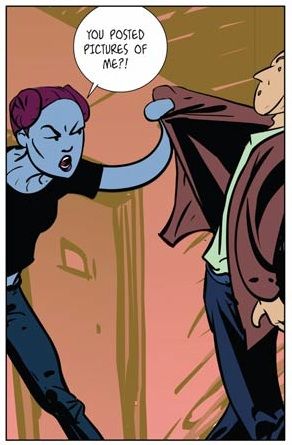Carabella has blue skin, a Princess Leia hairstyle, and an attitude about posting her personal details online. That's because she comes from a planet where social networking has gone from fun to mandatory, and no one has any personal privacy any more. So when a friend posts her picture online—and a group of Princess Leia look-alikes show up at her door—she freaks.
Carabella is the hero of Networked: Carabella on the Run, a graphic novel with a message: Think twice before putting your personal information online, whether on Facebook or your favorite shopping site. Produced by the nonprofit Privacy Activism, the book was written by Gerard Jones, illustrated by Mark Badger and funded by a grant from the Rose Foundation and published by NBM last month; it's also available as a webcomic on the Privacy Activism website.
I spoke to Linda Ackerman, the staff counsel for Privacy Activism, at the American Library Association meeting in Washington, DC, in June.
Brigid: Why make this a graphic novel?
Linda: Our purpose has been to try to educate people about privacy issues, visually where possible. There is enough legalese around. We wanted to be able to communicate information about privacy in an accessible way.
Brigid: What is the story about?
Linda: It's essentially about control of personal identification as a means of social control. It's about a character who comes from a planet where people's lives are completely controlled, they are designated as having certain characteristics and qualities, and she escapes and comes here and believes she is going to find a privacy paradise. She gets involved with a boyfriend who has designed these sports shoes that measure your bodily functions while you do sports. On her planet she was being controlled by her hair attachments, and she chops them off. He picks them up and incorporates the tracing technology into the shoes. Meanwhile, he has made a contract with a mega-capitalist who is going to market his shoes to the world, and he is going to be set for life, and she realizes what is going on, it's the shoes that are responsible for running everybody t ground
Brigid: What age group is it written for?
Linda: We consider it as being for middle school-high school. I think it's sort of a tween-young adult crossover.
Brigid: Why would I care about online privacy—especially if I were a teenager?
Linda: You would care because so much of your personal information is in other people's hands, for whatever purpose they like to use it. Sometimes it could be innocent or inconsequential, or merely commercial, collecting info on where you go online as a means of behavioral targeting, although the commercial stuff is becoming more and more insidious in my view. Jerry Jones, who wrote the story for this one, has already done a plot outline for a behavioral targeting book.
Brigid: So I look up a recipe for cupcakes, and then I get ads for cupcakes when I go to another site. Is that so bad?
Linda: An ad for cupcakes probably wouldn't bother you, and you might want the information about the cupcakes, but there is other information online having to do more with your behavior. There are a couple of notorious instances of photographs on Facebook that have led to people losing employment. One woman was claiming she had a disability, and there were photos of her [on Facebook] having fun, fun, fun.
Apart from the private and commercial enterprise of data collection, there are things like location privacy: If you're on Twitter and you don't have your location suppressed, everyone knows where you are, and they know if you are not at home, if they want to check out your house.
The friend I'm staying with just got back from Colorado, and he said you can only pay with a credit card on toll roads, so your location is tracked, and it is attached to your license plate, so it is not anonymous.
Technology is a boon, it is great for research, but it is also a place where criminals figure out interesting things to do, and where companies who want to sell to you can operate.


